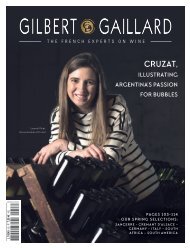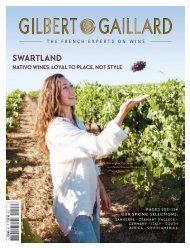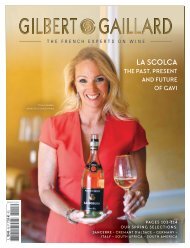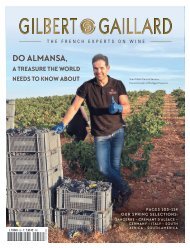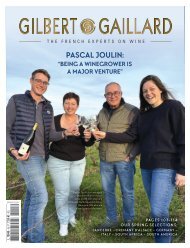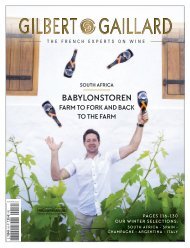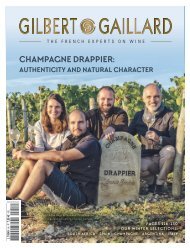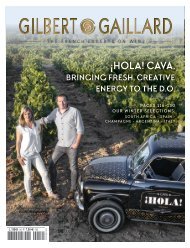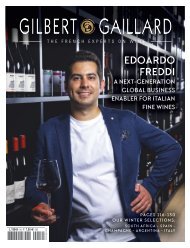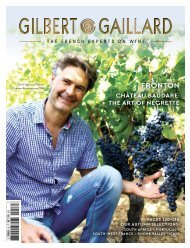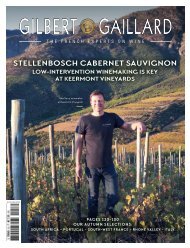Create successful ePaper yourself
Turn your PDF publications into a flip-book with our unique Google optimized e-Paper software.
BORDEAUX<br />
– GRAPES –<br />
future of Merlot is an issue of paramount importance. As<br />
he points out, Bordeaux has a very high quality image<br />
and one for age-worthy wines. Merlot is the signature<br />
grape for this style of wine. Climate change poses a<br />
threat to quality. Violleau is of the opinion that a very<br />
early harvest, for example in August to avoid excess<br />
sugar, would cause another problem. High temperatures<br />
in mid-summer would produce wines lacking freshness,<br />
and therefore balance. The winemaking process would<br />
then have to be altered, and inevitably the style of the<br />
wines would undergo a sea-change.<br />
Violleau believes that changing the blends is a more<br />
sensible route. Changes to specifications could allow this<br />
to happen, by increasing the proportion of Cabernet-<br />
Sauvignon for example. If this is done gradually, the<br />
style of the wines should not be undermined. The idea is<br />
for the changes to occur concurrently with generational<br />
turnover among consumers. Petit Verdot is also an<br />
interesting alternative, but only for winegrowers who<br />
prove to be very proficient at growing the variety. Another<br />
lever, of course, would be to slow down Merlot’s growing<br />
cycle as much as possible. As a reminder, Violleau<br />
says the Bordeaux wine marketing council (CIVB) has<br />
commissioned several studies, mostly with funding from<br />
the European Union.<br />
As regards water, he believes that the Aquitaine region<br />
has good rainfall. Any shortfalls are only occasional,<br />
so he feels that introducing irrigation would be the<br />
antithesis of Bordeaux. “Bordeaux is an exceptional<br />
brand name. The wines must remain age-worthy, and we<br />
must continue to move upmarket”, he claims.<br />
Mickaël Violleau of Altervini<br />
FAMILLE DUCOURT:<br />
REPLACING MERLOT SEAMLESSLY<br />
The Ducourt family manages 450 hectares of vines<br />
divided between 14 properties, which produce 6 Bordeaux<br />
appellations. They are spread across Entre-Deux-Mers, on<br />
the right bank, with one in southern Graves. Jonathan<br />
Ducourt is tasked with marketing and communications.<br />
52% of the family’s acreage is planted to Merlot, but the<br />
variety is no longer being replanted. The Saint-Émilion<br />
property has a single 5-hectare plot, entirely planted to<br />
Merlot. Here, the vines are only about fifteen years old,<br />
Jonathan Ducourt<br />
SPRING 2021 GILBERT & GAILLARD - THE FRENCH EXPERTS ON WINE 47



